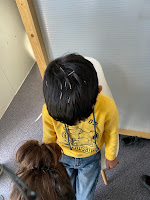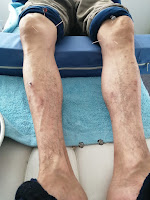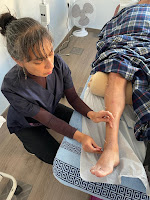I have just come back from a two week visit to Lesvos, where I was giving acupuncture to refugees living in the island hosted by the wonderful Earth Medicine project.
I arrived in the capital Mytilene early on Sunday 13th
of November after travelling all night and had the whole day to rest and
prepare for the week to come. I was given an update on the changes that had
happened since my last visit in July this year. The most important change was
that Earth Medicine obtained permission to work from within the camp so I was
to spend my two weeks working from their container located inside the refugee camp.
Our days started early, we would usually get to the Earth
Medicine house in Mytilene at 8am, have a quick breakfast and from there we would
go together to the camp. When I say “we” I mean Sabine, a homeopath from
Germany, Sohrab -Earth Medicine’s worker who, amongst other things, drives,
translates from the different Afghan languages into English, fixes what needs
fixing and buys fresh bread for breakfast-, sometimes Fabiola -Earth Medicine’s
founder and director-, and me. Behind the scenes, we had Malvina who works at
the office and gets all the administrative things sorted for all of us; and Ali
who was cooking food that he would lovingly serve for us when we came back from
the camp.
 |
| EM's container inside Lesvos refugee camp Photo by Thomas Rajten |
Days in the camp went very quickly. During my first week, I
gave between 8 and 10 treatments per day, and on the second between 11 and 13
per day. Most of the people I treated were new arrivals, and I saw as many men
as women with ages ranging between 5 years and 67. The most common issues were
severe back pain and knee pain from over use and exhaustion after very long and
dangerous journeys, anxiety and insomnia, abdominal pain, poor appetite and
digestion, and severe weakness. Amongst the women, menstrual irregularities
were common ranging from very scant irregular periods to extremely painful
periods and excessive menstrual bleeding. Most of these symptoms were
exacerbated by the conditions in the camp at this time of year. Those staying
in tents (usually the most recent arrivals) were freezing cold all the time
which increased the severity of their pain. In addition, the heavy rains that
we had while I was there easily flooded the camp and meant that going to the
toilet or to get food would result in being soaked and cold for the rest of the
day.
I used scalp and/or ear acupuncture on most people to help with pain, mobility and to calm the nervous system, body acupuncture to address pain and issues with bodily functions, different types of moxibustion for pain and to strengthen the body, cupping on those with severe tension, and massage whenever needed to relax muscles and soothe a person. We also had the heat lamps kindly donated by the organisations Acupuncture Sans Frontiers and Le Mains du Coeur Pour le Cambodge, they have proven a hit with the cold weather and we used them on practically everyone who came for treatment this time. Also thanks to these two organisations, other acupuncturists from Europe have been able to come and work with Earth Medicine this year. As a result, we have managed to get some continuity in treatments and acupuncture has become a well known treatment amongst the refugees.
There are two things that, in my view, are quite unique in the work we can do at Earth Medicine: one of them is that we get to treat people every single day which gives us the opportunity to check progress and change strategies if needed to achieve the best results. The other one is the multi-disciplinary approach, getting to work alongside practitioners of other disciplines and finding out how we can combine efforts for the greatest benefit to those we are treating.
 |
| Combining acupuncture and physical therapy Photo by Thomas Rajten |
 |
| Lesvos abundant veg |
I went back to visit the burial ground where the bodies of
refugees have been laid to rest by the local authorities. The last time I was
there, the grass was overgrown shoulder-high, and it was not possible to see
clearly many of the graves. This time, the grass had been cut and the site
cleared and I could see clearly the hundreds of graves ( I estimated at least
200). They were mostly marked by wooden sticks with a number, some with white
headstones which sometimes had the names and dates of passing of the refugees
written in fading letters, and only 3 or 4 graves are done in what I imagine is
the proper way, I was told because the family of the deceased was around and
could afford to do this. I could also see an area that had been marked and
separated for 16 graves, most probably destined for the 16 refugees who drowned
in the waters around the island while trying to get to safety, over a month
ago. Visiting this place to pay my respects has become an important part of my
visits to Lesvos. Nobody knows how many lives have been lost since what is called "the refugee crisis" started, and
it’s possible that somewhere, their loved ones are still waiting to hear news
from them. It would be even more heart-breaking than it already is, if we left
them sink into oblivion.
 |
| Three graves, one of them a child's |
 |
| Space separated for 16 new graves |
 |
| A mother and child |
When I asked after all the people I had met before, I was told not many were still in Lesvos. The majority of them had been granted asylum and moved on – mostly to Germany, and some others had been relocated to other camps in mainland Greece. I did manage to say good bye to one family I met earlier this year. The father has an amputated leg and their journey from Afghanistan had been excruciatingly difficult. The mother and the daughters were getting all their things ready to travel to Germany after being granted asylum when I stopped by the container which served them as home for the last 6 months. I felt so happy for them, and for all those I didn’t get to say good bye to. May they all get to feel safe, and have beautiful and prosperous futures.
Every time I have been to Lesvos, despite all the horrific stories, the pain I see in people's bodies and souls, and the less than ideal conditions they have to live in; I somehow come back full of hope, with my heart expanded with compassion and love for all my fellow human beings. This is partly because I see so much resilience, strength, hope and faith in people there that I think to myself, if they can display those amazing qualities under their circumstances, how could I not? On top of that, it's not like there is only sadness. Within the difficulties, there are always beautiful moments of laughter, friendship, connection and true sisterhood and brotherhood between us all. May there be a world one day, in which we will all be able to enjoy moments like these with each other.
 |
| A joyful moment Original photo by Thomas Rajten |
If you would like to support the Earth Medicine's work in Lesvos, click here
You can also read about my first, second, and third trips to Lesvos.


















